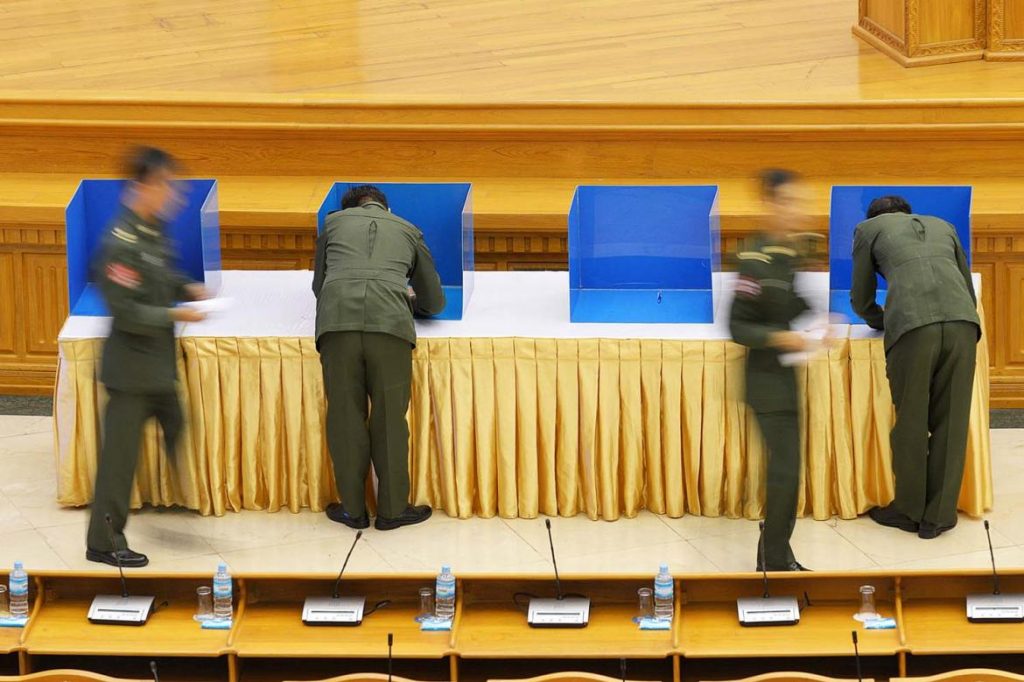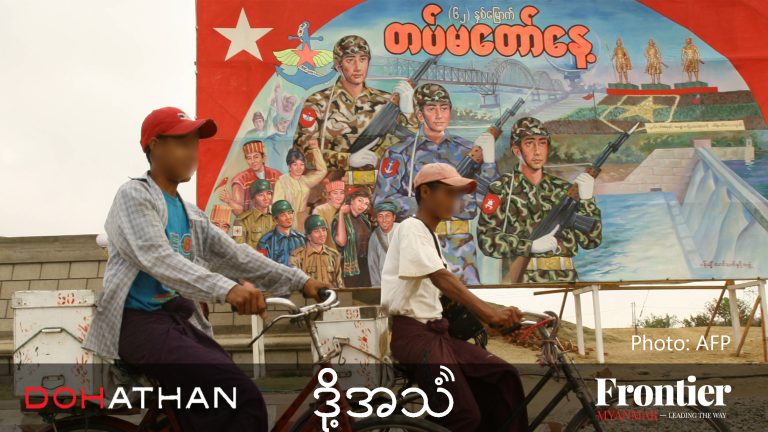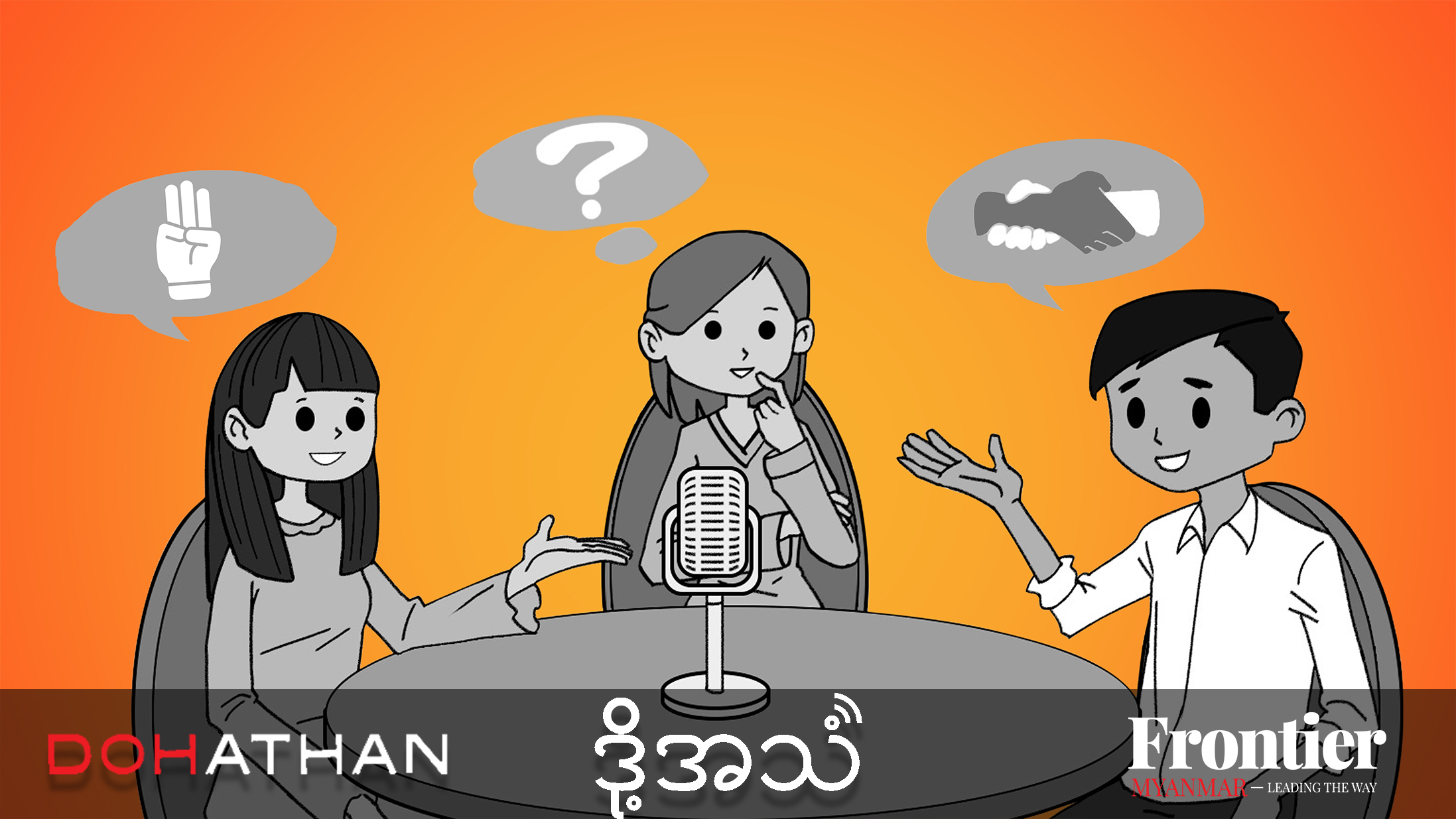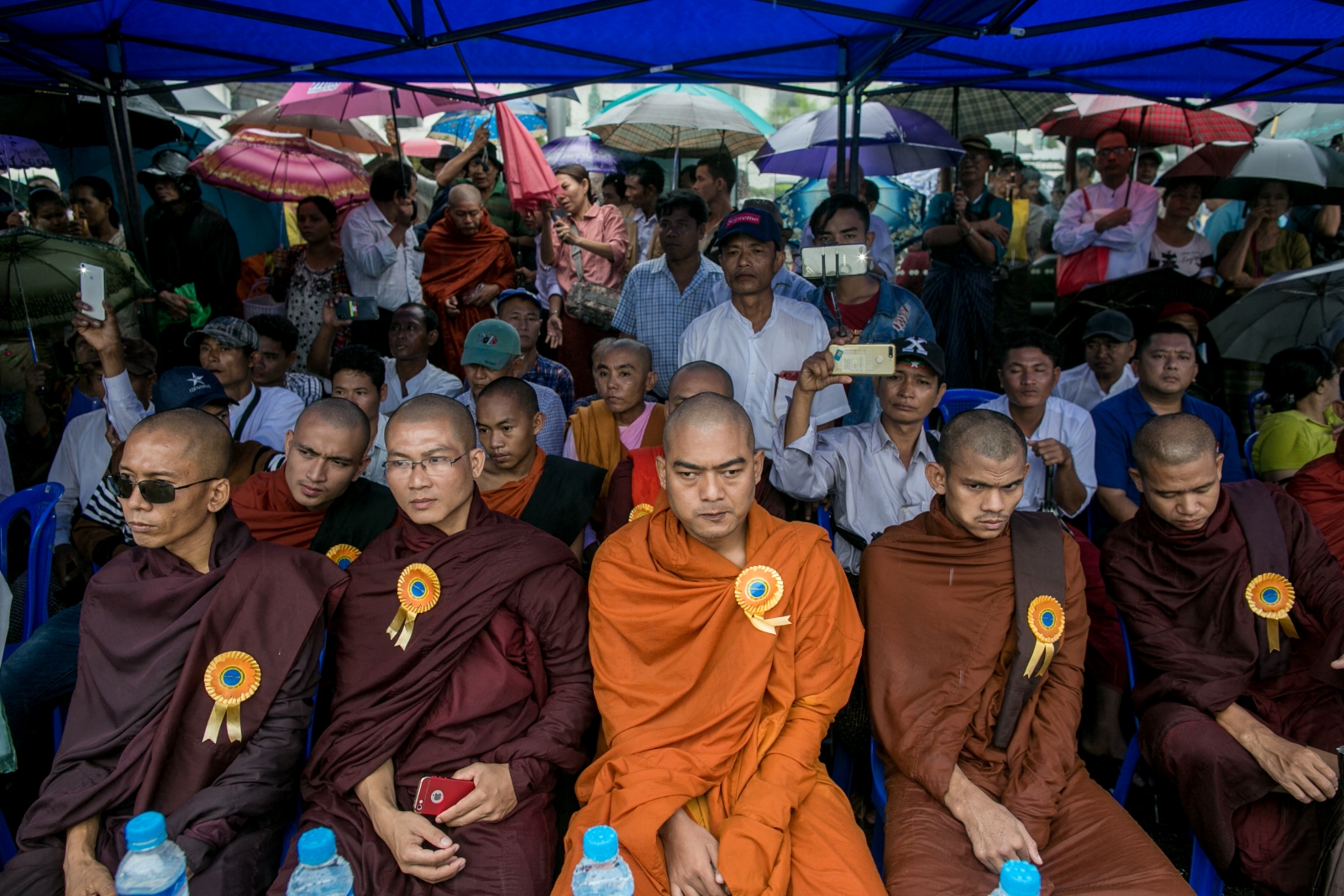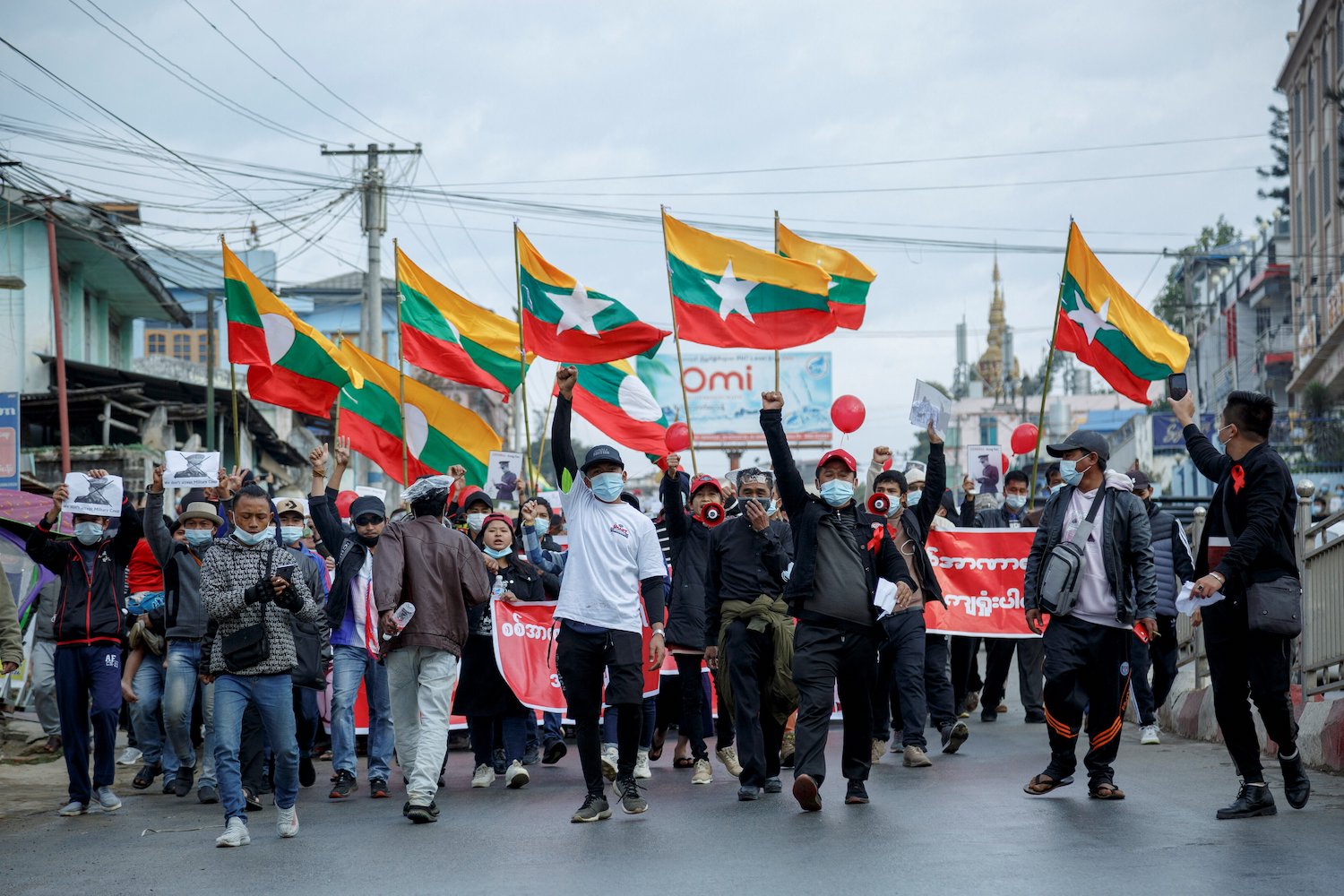The National League for Democracy has met an election pledge with its move to amend the constitution, but there’s scepticism about its chances of success without Tatmadaw support.
By YE MON | FRONTIER
IN A SURPRISE move on January 29, the National League for Democracy launched its first attempt in the current parliament to amend the military-drafted 2008 Constitution.
The ruling party has proposed the appointment of a parliamentary committee to draft amendments to the constitution.
The move fulfills a key election pledge of the NLD, which had campaigned vigorously for constitutional reform while in opposition during the previous Union Solidarity and Development Party government. A joint campaign by the NLD and the 88 Generation Peace and Open Society movement in 2014 attracted more than five million signatures in support of charter change.
The constitution, which the military junta had claimed was supported by 92.4 percent of voters in a May 2008 referendum, gives the Tatmadaw an effective veto over charter reform and its Commander-in-Chief the right to appoint the ministers for defence, home affairs and border affairs. The president may only dismiss officers heading any of the three ministries with the agreement of the Commander-in-Chief.
Wielding the veto
Support more independent journalism like this. Sign up to be a Frontier member.
The unelected military lawmakers who hold 25 percent of seats in the Pyidaungsu Hluttaw, Myanmar’s national legislature, have an effective veto over charter change under section 436 of the constitution because it requires amendments to be supported by 75 percent of lawmakers.
An attempt to lower the voting threshold was among six proposed amendments contained in an amendment bill submitted to the 664-member Pyidaungsu Hluttaw in June 2015. Of the six, only one change was approved: a qualification that required presidential candidates to be well acquainted with “military affairs” was changed to being knowledgeable about “defence affairs”.
The vote to lower the amendment threshold to 70 percent was supported by 388 MPs, or 67 percent of the 583 lawmakers at the joint sitting.
Also defeated was a minor adjustment to section 59(f), under which State Counsellor Daw Aung San Suu Kyi is ineligible to be nominated for the presidency because she was married to a foreigner and her sons are foreign citizens.
The proposed amendment, to remove the clause making someone ineligible for the presidency if they have a foreign spouse or foreign children, attracted the support of 55 percent of lawmakers, according to state media.
A second amendment bill was also tabled in June 2015, and again most of its key proposals were blocked by the military.
Since first campaigning for political office at the 2012 by-elections, the NLD has declared constitutional reform to be among its top priorities. The party’s lawmakers took part in the Constitution Review Committee and Constitution Amendment Implementation Committee that were set up to prepare the 2015 amendment bills.
Conditions attached
The Tatmadaw has often said it would not oppose changes to the constitution if it believed they were in the national interest – a point emphasised by Commander-in-Chief Senior General Min Aung Hlaing in comments to reporters during a news conference at a military exercise in Meiktila Township on January 31.
He said he had made clear his willingness to amend the constitution “many years ago”, during the term of the U Thein Sein government.
“I never said the constitution would not be amended,” Min Aung Hlaing was quoted as saying. “But it needs to be amended systematically.”
However, military lawmakers have opposed the NLD’s move because they say it breaches parliamentary procedures.
Unelected Tatmadaw MPs criticised the proposal to appoint a parliamentary committee to draft changes to the charter after it was tabled in the Pyidaungsu Hluttaw by Amyotha Hluttaw lawmaker U Aung Kyi Nyunt (NLD, Magway-4), a member of the party’s central executive committee.
Pyithu Hluttaw lawmaker Brigadier-General Maung Maung said the move breached parliamentary procedures because MPs seeking to change the charter should have first submitted draft amendments accompanied by the signatures of 20 percent of Pyidaungsu Hluttaw members.
“We want them to follow the procedure,” he said.
Tatmadaw MPs boycotted discussion on the urgent proposal when it was debated on February 4.
Pyidaungsu Hluttaw deputy speaker U Htun Htun Hein told the chamber on February 6 that the urgent proposal was in line with parliamentary by-laws and was in the national interest because it was linked to the peace process.
The joint committee will be chaired by Htun Htun Hein and its membership will reflect the proportion of seats that political parties and the Tatmadaw hold in the Hluttaw, ensuring that NLD lawmakers will be in the majority. The Pyidaungsu Hluttaw has not yet confirmed how many members will sit on the committee.
The process
After the committee is formed it will begin the process of drafting a bill that lists the constitutional provisions to be amended or abolished. Lawmakers and political analysts say the process is likely to be lengthy.
Yangon-based political analyst U Yan Myo Thein told Frontier on February 6 that the committee would need to set a timeframe for its work. Formal and informal negotiations between civilian and military leaders would need to take place concurrently if the process is to be successful.
He said the committee should also take into account developments in the peace process, particularly agreements on the contents of a future Union Peace Accord. At the 21st Century Panglong Union Peace Conferences, negotiators have already reached agreement on dozens of points for inclusion in the accord. Incorporating the accord into the constitutional amendment process “will support the development of federalism”, Yan Myo Thein added.
The sections on which the committee is likely to focus are 59(f), 436(a) and 261, which outline the qualifications required of chief ministers of states and regions and the procedure under which they are appointed by the president. Section 436(a) lists the 108 constitutional provisions for which both a vote of more than 75 percent of Pyidaungsu Hluttaw lawmakers and the support of more than 50 percent of voters in a national referendum are required to pass an amendment.
Aung Kyi Nyunt told Frontier that he believed sections 59(f) and 436(a) could be amended and the NLD would hold talks with other parties about other sections in need of reform or abolition.
Section 261 gives the president the power to nominate state and region chief ministers regardless of which party wins the largest number of seats in the state or region legislature. This was an issue in Rakhine State after the 2015 election when a member of the NLD was appointed chief minister against the wishes of the Arakan National Party, which had won more than twice as many seats in the state assembly.
Another issue is resource sharing between the national and sub-national governments. During debate on the NLD proposal, Pyithu Hluttaw MP Sai Tun Aye (Shan Nationalities League for Democracy, Mongshu) said on February 5 that the constitution was not in line with federalism and needed to be changed to satisfy demands by the states and regions for a more equitable sharing of national resources.
Is success likely?
Political analysts and the leaders of ethnic armed groups doubt that the move by the NLD will succeed, at least on the presidential eligibility criteria and reducing the threshold for future amendments.
Yan Myo Thein said the move to amend the constitution was unlikely to succeed without discussion and agreement on proposed changes between the NLD and the Tatmadaw leadership.
“I don’t think that we should be getting too excited about the prospects for amendments,” he said.
However, he said military MPs and the commander-in-chief would likely support amendments to section 261 aimed at giving state and regional hluttaws the right to nominate and appoint chief ministers, as it would help to strengthen federalism. “I believe it can be amended at this time,” he said.
Colonel Hkun Oakkar, patron of the Pa-O National Liberation Organization, told Frontier on February 7 that the second attempt in parliament to amend the constitution had little chance of success without the support of the Commander-in-Chief.
He expressed appreciation that the NLD had launched an attempt to amend the constitution, but said the process should have begun with “easy points”.


